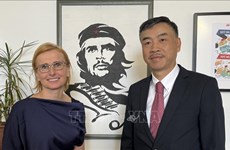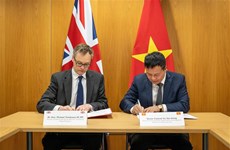President holds bilateral meetings in Egypt
State President Nguyen Minh Triet on
July 14 met with leaders of the Democratic People’s Republic of Korea
(DPRK) and Namibia on the sidelines of the 15 th Non-Aligned Movement
Summit Meeting in Egypt.
State President Nguyen Minh Triet on
July 14 met with leaders of the Democratic People’s Republic of Korea
(DPRK) and Namibia on the sidelines of the 15 th Non-Aligned Movement
Summit Meeting in Egypt.
At his meeting with the President of the Presidium of the Supreme People’s Assembly of the DPRK Kim Yong Nam , President Triet reiterated that Vietnam consistently treasures its traditional friendship and cooperation with the DPRK and will continue to further boost those ties for the benefit of the two countries’ people.
He congratulated the DPRK leader on his re-election as President of the Presidium of the DPRK Supreme People’s Assembly and expressed his pleasure at new developments, especially in economy, in the relations between the two countries.
The Vietnamese President expressed hopes that the joint ventures established by Vietnamese businesses in the DPRK would contribute to deepening the two countries’ cooperation and friendship.
He also proposed that the two countries coordinate to jointly organise celebrative activities to mark the 60 th anniversary of their diplomatic relations in 2010.
In regard to the situation on the Korean peninsula, President Triet affirmed, “ Vietnam always supports peace, stability, and cooperation on the Korean peninsula as well as the process of denuclearisation and the settlement of all disputes through peaceful negotiations there.”
He expressed hope that the concerned parties would refrain from further complicating the situation and soon hold dialogues to seek appropriate solutions to disputed issues.
“As a non-permanent member of the United Nations Security Council, Vietnam has its responsibility for the international community, striving for the common cause of maintaining the Korean peninsula of peace, stability, and cooperation and without nuclear weapons,” President Triet said.
President Triet also took the occasion to send his regards to the General Secretary of the Korean Workers’ Party Kim Jong-Il and other DPRK leaders.
In reply, President Kim Yong Nam stressed the fact that the DPRK and Vietnam have established special time-honoured relations, fostered by the close relationship between the late Presidents Ho Chi Minh and Kim Il Sung, which also served as a solid foundation for bilateral ties to continue to grow.
He recalled Party General Secretary Nong Duc Manh’s recent visit to the DPRK, describing it as an important and significant step in advancing the two countries’ ties to a new level of growth.
The DPRK leader affirmed that his country has been striving for a Korean peninsular free from nuclear weapon.
Meeting with Namibian Prime Minister Nahas Angula, President Triet affirmed that Vietnam always attaches importance to traditional friendship with African countries, including Namibia .
Vietnam highly appreciated Namibia active contributions to operations of the United Nations, the African Union (AU), the Southern African Development Community (SADC) and the Non-Aligned Movement, he said.
The Vietnamese President said the two countries have their respective potential and many similarities so they can supplement each other for mutual development.
Vietnam is ready to share experiences with Namibian in agriculture, fisheries, health care and education. Besides helping Namibia implement its national food security programme through the UN Food and Agriculture Organisation. Vietnam can send experts and businesses to Namibian for further cooperation in a bilateral framework.
Sharing the views with the Vietnamese leader, PM Nahas Angula said on the basis of fine political relations, the two countries now need to boost economic cooperation by actively implementing reached agreements.
He asked for Vietnam ’s help in rice cultivation and aquaculture, adding that Namibia also welcomes Vietnamese businesses to the country for business and investment.
Discussing on international issues, PM Nahas Angula said that in the circumstance of the global financial crisis and economic slowdown, Southern countries need to boost cooperation in trade and investment in order to play a more proactive role in coping with impacts of the crisis./.
At his meeting with the President of the Presidium of the Supreme People’s Assembly of the DPRK Kim Yong Nam , President Triet reiterated that Vietnam consistently treasures its traditional friendship and cooperation with the DPRK and will continue to further boost those ties for the benefit of the two countries’ people.
He congratulated the DPRK leader on his re-election as President of the Presidium of the DPRK Supreme People’s Assembly and expressed his pleasure at new developments, especially in economy, in the relations between the two countries.
The Vietnamese President expressed hopes that the joint ventures established by Vietnamese businesses in the DPRK would contribute to deepening the two countries’ cooperation and friendship.
He also proposed that the two countries coordinate to jointly organise celebrative activities to mark the 60 th anniversary of their diplomatic relations in 2010.
In regard to the situation on the Korean peninsula, President Triet affirmed, “ Vietnam always supports peace, stability, and cooperation on the Korean peninsula as well as the process of denuclearisation and the settlement of all disputes through peaceful negotiations there.”
He expressed hope that the concerned parties would refrain from further complicating the situation and soon hold dialogues to seek appropriate solutions to disputed issues.
“As a non-permanent member of the United Nations Security Council, Vietnam has its responsibility for the international community, striving for the common cause of maintaining the Korean peninsula of peace, stability, and cooperation and without nuclear weapons,” President Triet said.
President Triet also took the occasion to send his regards to the General Secretary of the Korean Workers’ Party Kim Jong-Il and other DPRK leaders.
In reply, President Kim Yong Nam stressed the fact that the DPRK and Vietnam have established special time-honoured relations, fostered by the close relationship between the late Presidents Ho Chi Minh and Kim Il Sung, which also served as a solid foundation for bilateral ties to continue to grow.
He recalled Party General Secretary Nong Duc Manh’s recent visit to the DPRK, describing it as an important and significant step in advancing the two countries’ ties to a new level of growth.
The DPRK leader affirmed that his country has been striving for a Korean peninsular free from nuclear weapon.
Meeting with Namibian Prime Minister Nahas Angula, President Triet affirmed that Vietnam always attaches importance to traditional friendship with African countries, including Namibia .
Vietnam highly appreciated Namibia active contributions to operations of the United Nations, the African Union (AU), the Southern African Development Community (SADC) and the Non-Aligned Movement, he said.
The Vietnamese President said the two countries have their respective potential and many similarities so they can supplement each other for mutual development.
Vietnam is ready to share experiences with Namibian in agriculture, fisheries, health care and education. Besides helping Namibia implement its national food security programme through the UN Food and Agriculture Organisation. Vietnam can send experts and businesses to Namibian for further cooperation in a bilateral framework.
Sharing the views with the Vietnamese leader, PM Nahas Angula said on the basis of fine political relations, the two countries now need to boost economic cooperation by actively implementing reached agreements.
He asked for Vietnam ’s help in rice cultivation and aquaculture, adding that Namibia also welcomes Vietnamese businesses to the country for business and investment.
Discussing on international issues, PM Nahas Angula said that in the circumstance of the global financial crisis and economic slowdown, Southern countries need to boost cooperation in trade and investment in order to play a more proactive role in coping with impacts of the crisis./.













